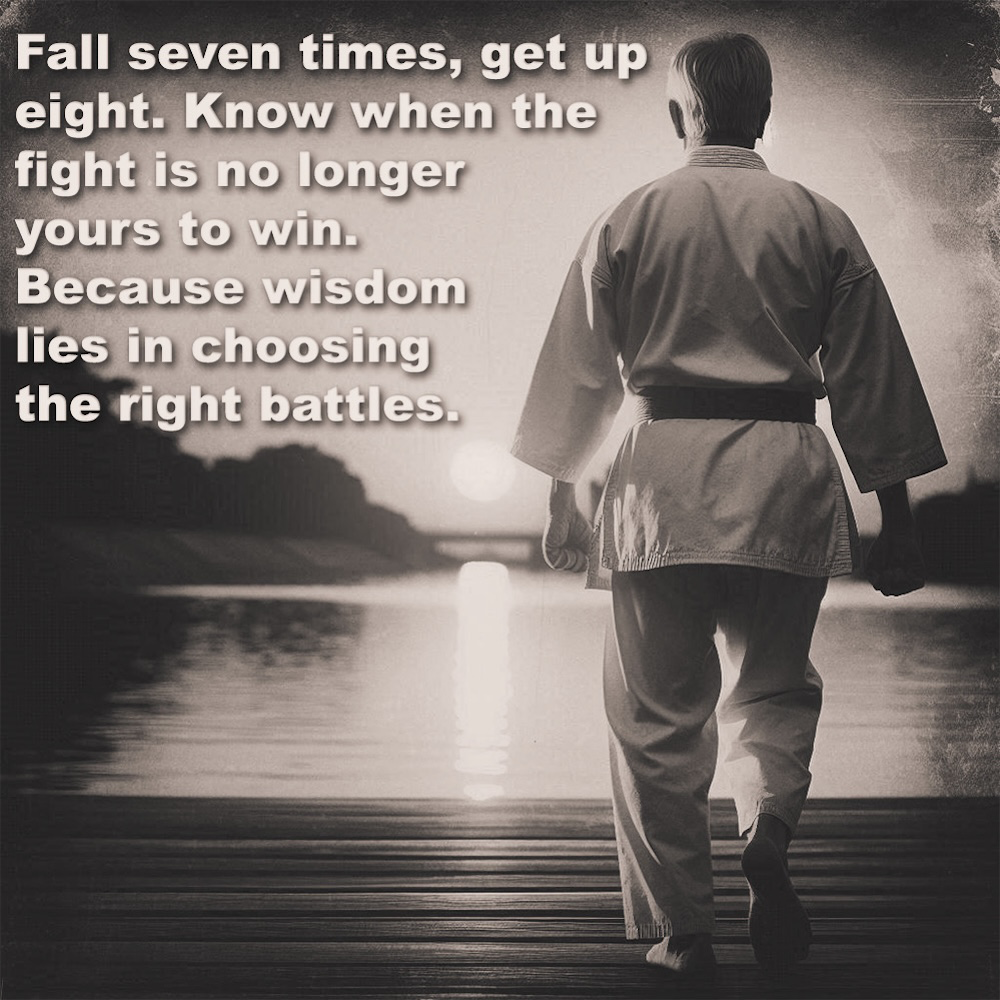
(2 minute 25 second read)
‘Knowing when to walk away is wisdom. Being able to is courage.’ This sentiment reflects a profound truth that extends beyond martial arts into the realm of life’s challenges.
.
In the martial arts, the mantra of never giving up is deeply ingrained in us all from the beginning of our training. But is it always the right approach?
.
Persisting in the face of challenges can be beneficial, but it also comes with a cost. Continuously pushing forward without considering when to step back can lead to wasted time and energy.
.
There’s a fine balance between persistence and stubbornness. Sometimes, the wisest decision is to recognize when your efforts are not yielding the desired results and to step back.
.
The Japanese proverb “Nana korobi ya oki” (七転び八起き) means “fall down seven times, get up eight.” But it’s not just about getting up; it’s about learning from each fall and using that knowledge to rise stronger.
.
I’m sure many of you have found yourselves in situations where perseverance seemed futile, and you had to contemplate whether to press on or let go.
.
Decisions are rarely black and white and it’s essential to weigh the benefits of continuing against the potential gains of exploring other options.
.
Do you need to quit entirely, or is it just a matter of taking a pause to regain perspective?
.
In my opinion, many students give up far too easily today. They are led to believe that if it’s not perfect then it’s okay to just give in. That’s a mistake. Sometimes you have to take a step back, to move forward.
.
Karate, like many endeavors, can have moments that feel overwhelming. The physical demands can be strenuous, mastering techniques takes time, and facing challenges can be discouraging. However, quitting at the first sign of difficulty throws away the valuable lessons learned on the journey.
.
Persevering through tough moments, you can develop not only physical strength and the many other skills karate has to offer, but also cultivate mental resilience and the grit to push through obstacles.
.
This determination can spill over into other aspects of your life, making you a better student, and a better person as a whole.
.
If you need to step away, sometimes taking a break can provide clarity and help you reassess your priorities and what you really want.
.
However, it’s important to distinguish quitting from taking a strategic pause. If karate holds significant value for you and you’ve already invested considerable time and effort, a brief hiatus can be a valuable first step.
.
Stepping away for a short period allows you to recharge and return with renewed focus. After a period of reflection, you can decide whether to resume your karate journey with newfound determination, or move in a different direction entirely.
.
The key is to approach this decision with a clear head.
.
Ultimately, there’s no one-size-fits-all solution to life’s challenges. Every decision involves uncertainty, and it’s up to you to make the best choice given the circumstances.
.
The key is to find the balance between the perseverance embodied in “Nana korobi ya oki” and the wisdom of knowing when to walk away. There will be times to fight through adversity, and there will be times to strategically retreat and choose a different path.
.
Fall seven times, get up eight. Know when the fight is no longer yours to win. Because wisdom lies in choosing the right battles.
